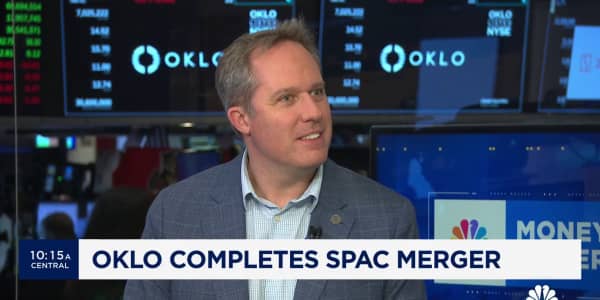The big money can't make up its mind about stalled haircut giant Regis.
One prominent hedge fund manager, Starboard Value, just exited its investment despite years of work on a corporate turnaround.
Another, Birch Run Capital Advisors, keeps buying more stock in hopes of a board-engineered revival. Wall Street analysts are neutral. And other investors are short the stock, believing earnings will continue to deteriorate despite a new management team that has cut costs and reinvested in the business.
Minneapolis-based Regis owns some of the best-known salon chains—including Supercuts, Sassoon Salon, Regis Salons, MasterCuts and SmartStyle—whose more than 7,000 locations dot malls and Wal-Marts across the country (some are abroad, too).
But Regis isn't as powerful as it used to be. Comparable same-store sales had been in decline for six years until the last fiscal quarter. While the now-$17 stock is up about 20 percent in 2014 on hopes of a turnaround, it's down from a high of $46 in December 2004 and has hovered below $20 since 2008.
Starboard Value, the $3 billion activist hedge fund led by Jeffrey Smith, closed its position in Regis sometime between June 1 and Aug. 31, according to a letter to investors obtained by CNBC.com.
Starboard came in aggressively in 2011 after Regis tried and failed to sell itself the year before. The hedge fund firm called the company "deeply undervalued" because of "bloated" expenses and "lack of operational focus." Starboard, owning more than 2 million shares, won the subsequent proxy contest, gaining three board seats and ultimately shaking up Regis' leadership in 2012 with a new CEO and CFO. Regis also sold two major units, Hair Club for Men and Woman and European salon operator Provalliance.
But Starboard, more recently known for activism in Darden Restaurants and Yahoo, sold the majority of its shares and Smith left the board in October 2013, citing a "vastly improved" company (two of its directors are still in place—James Fogarty and David Williams). Starboard still held on to convertible bonds with 5 percent interest that came due in 2014, causing the position exit.
The investment appears to have been only slightly lucrative for Starboard. The stock rose modestly from when Starboard first requested board seats in August 2011 ($13.64) to the sale period of June 1, 2014 ($13.75) and Aug. 31 ($15.11). The shares are up 20.7 percent year to date and 16.6 percent over the past month. The gain since the August 2011 date is 28.5 percent—a sizable improvement but well below the broader market performance.
Read More
A representative for Starboard did not respond to a request for comment. The Starboard Value and Opportunity Fund is up 10.33 percent this year through October, according to an investor in the fund.
Birch Run’s bounce-back bet
Birch Run is only buying more stock. The small hedge fund, co-founded by Daniel Beltzman and Gregory Smith, invested big in early 2012, buying nearly 5 million shares. It has doggedly stayed in Regis hoping for a turnaround, and Beltzman even became a director in 2012. Beltzman and the firm have steadily bought more stock over the last two years, helping support its price.
Birch Run—which managed about $500 million for wealthy families at the end of 2013—has a lot of incentive to make its play work.
It owns more than 10 million shares, amounting to about 19 percent of all Regis stock as of Oct. 24, making it the largest shareholder. Roughly 40 percent of the hedge fund's publicly reported portfolio is invested in Regis, according to June 30 filings. The stock is Birch Run's largest holding and is an unusually concentrated bet (about 30 percent of the book is in Walter Investment Management, which services and originates mortgage loans).
The New York-based hedge fund firm practices a so-called value strategy, meaning it takes long-term positions in companies it believes have potential to improve.
Like Starboard, the bet appears to be profitable for Birch Run—but not a home run. The stock is up about 8.4 percent since its first big publicly disclosed position was taken on Jan. 27, 2012.
A spokesman for Birch Run declined to comment. But Daniel Hanrahan, Regis' CEO since 2012, complimented Beltzman's involvement with the company.
"He adds a lot of value as a board member," Hanrahan said in an interview. "He's a very long-term thinker and is focused on how he can help us build the right strategy to make this a very successful company."
Hanrahan said Beltzman's voice is helpful but he's not driving board decisions. He acknowledged declining sales but was confident that investments in salon operations and staffing would eventually pay off.
"We know that we still have a lot of work to do but believe strongly that the strategy is the right one and we're heading in the right direction," Hanrahan said.
Hanrahan and the relatively new board are focused on three things to improve the business: "Asset protection" to prevent theft; helping improve salon leadership; and technical training to help attract and retain hairstylists.
Shorts in play
Not everyone is convinced the plan will work. A relatively small group of short sellers are betting on a negative thesis and hold nearly 6 percent of Regis' 55.6 million outstanding shares. One large family office, for example, has a $10 million short position, according to a person familiar with the situation.
Jamie Yackow, an analyst at hedge fund Moab Partners, revealed some of the negative views on Regis in an earnings call with Hanrahan on Nov. 4.
"Why are you guys so optimistic when EBITDA continues to decline 20 percent year over year?" Yackow asked, referring to earnings before interest, taxes, depreciation and amortization.
He also said he was concerned about increased health-care costs under the Affordable Care Act and asked when all the investments Regis was making would start to show up in better revenues.
"We feel good about the fact that we've been able to arrest the decline, but as we said throughout the call today, we believe that we still have a lot of work to do to reach the full potential that is available to us," Hanrahan said in response.
Hanrahan separately told CNBC.com that health-care costs hadn't risen under the Affordable Care Act. "I'm not sure where those questions came from," Hanrahan said about new costs potentially eating as much as half of gross earnings, as Yackow put it.
Michael Rothenberg, portfolio manager at Moab, declined to comment on if he was short the stock or on Regis generally. Moab was long the stock in late 2010 when it seemed likely Regis would be sold to a private equity firm.
Analysts neutral
The four analysts who track Regis have "hold" ratings on the stock, meaning they have a neutral point of view and do not recommend buying or selling it.
"We do not see any shortcuts in management's turnaround efforts," Jeff Stein of Northcoast Research wrote in a note Nov. 5. "Retail service businesses by nature are labor intensive, and it's clear that strategic initiatives are designed to change the culture of the company. The company is building accountability into the organization through its leadership development, training and asset protection programs."
But Stein noted signs of progress in low-cost brands Smartstyle and SuperCuts but slips in comparable sales at higher-cost chains like Regis Salons.
"Management once again did not provide any guidance or a specific timeline for its turnaround strategy, indicating that while it is encouraged by the directional-sales trend improvement, it is still quite early, and improvement is unlikely to be linear," analyst Daniel Hofkin added in a research note from William Blair & Co.
"The company remains encouraged by progress at a growing subset of salons driving positive service comps, with regional managers, district leaders, salon managers and stylists all executing, in unison, the company's strategy under the new senior management team," Hofkin added. "The challenge will be sustaining this progress, extending it to a much larger portion of the company over time, and leveraging labor expense in the process."
For the last quarter ended Sept. 30, Regis reported sales of $464.6 million, a decline of $4 million from the year before. Same-store sales increased 0.6 percent, the first rise in years. EBITDA was $22.1 million, down from $27.4 million.






